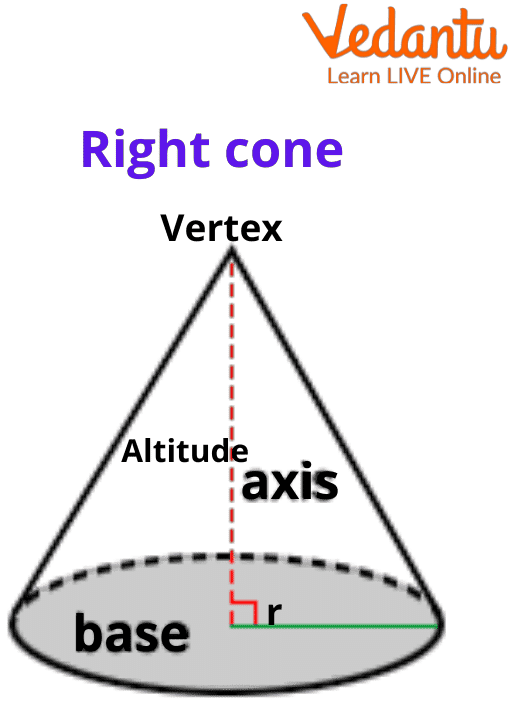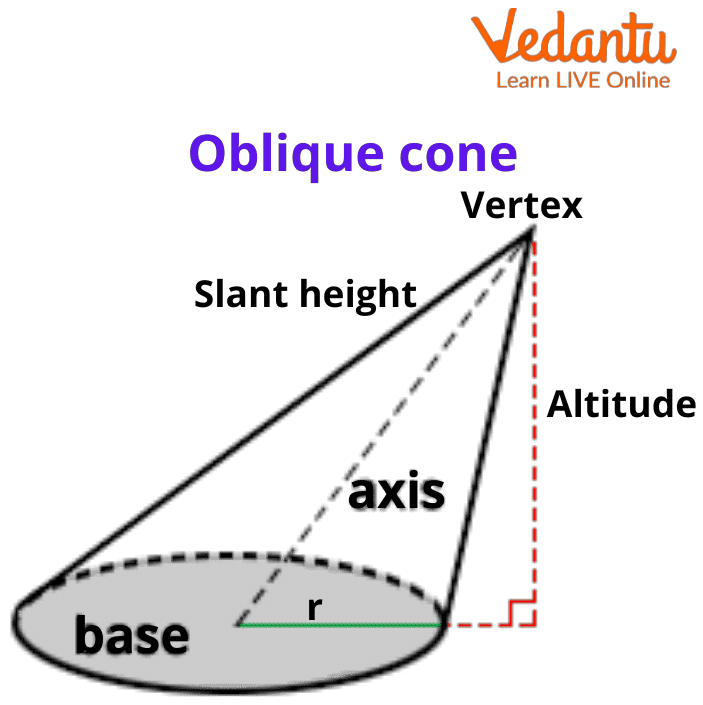




How to Identify and Apply Cone Shapes in Everyday Life
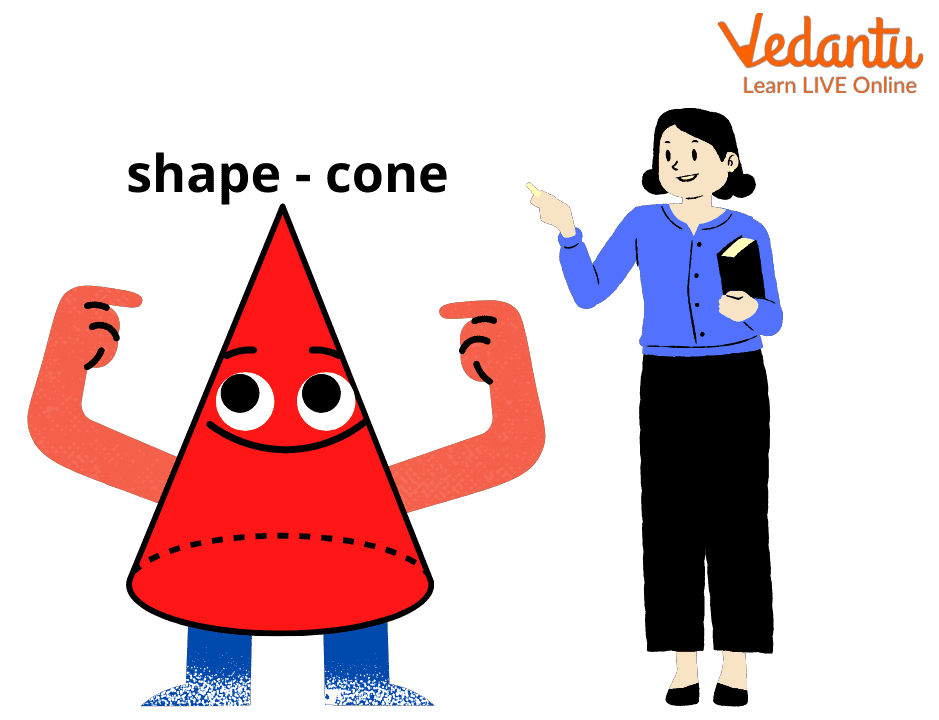
What is a Cone?
Do you like eating ice cream or wearing a birthday cap? Do you know they have something in common? Yes, these both have the same shape called the ‘cone.’ A cone shape is a three-dimensional geometric figure that has a curved surface, which is pointed towards the top. It is called the apex or vertex of a cone. The base of a cone has a flat circular surface. A cone has zero edges.
Are you excited to know more about this unique cone shape? Let us learn together about its types and properties, and we will also solve some questions.
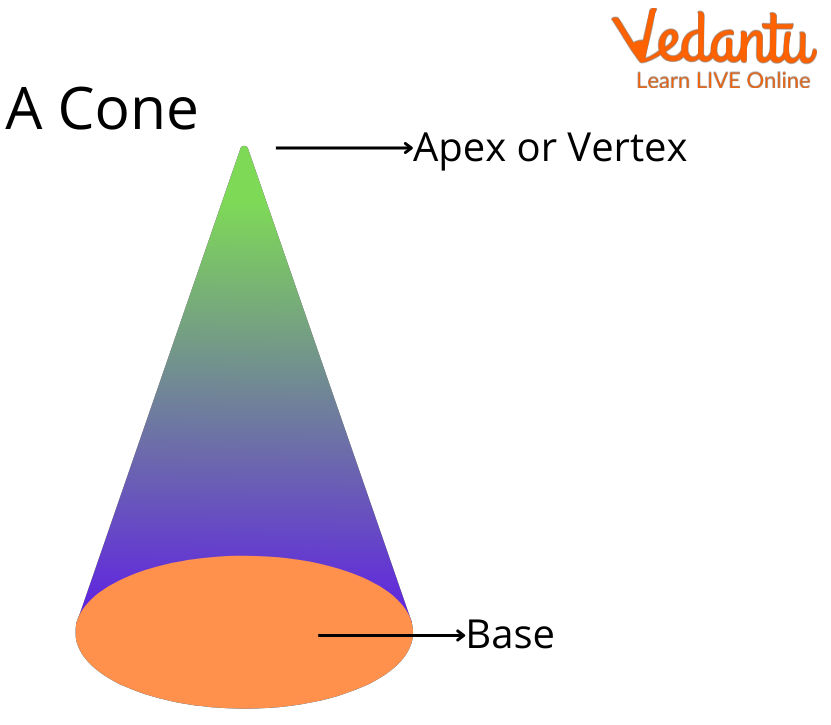
Elements of the Cone Shape
The three elements of the cone are:
Radius: The radius 'r' of a cone is the distance between the centre of the base of a cone to any point on the circumference of the base.
Height: The height 'h' is the distance between the vertex of the cone and the centre of its base.
Slant Height: It is the slanting length ‘l’ between the vertex of the cone shape and any point on the circumference of the base of a cone.
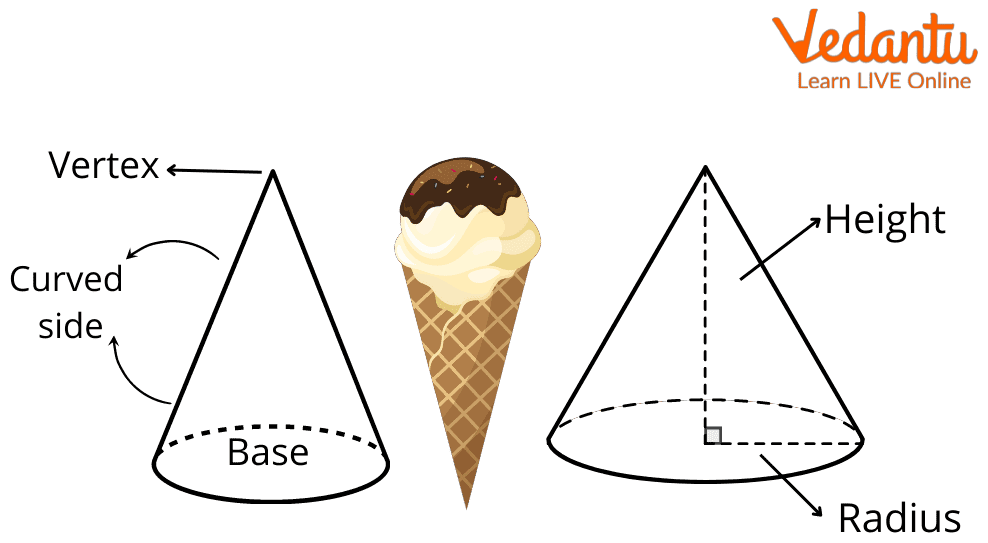
Types of Cones
A cone shape can be divided into two types, based on where its vertex is located.
Cone Formulas
For a cone shape with radius r, height h, and slant height l, its formulas are:
The slant height of the cone = √(r2+h2).
The total surface area of the cone = πr(l + r) square units.
The curved surface area of the cone = πrl square units.
The volume of the cone = ⅓ πr2h cubic units.
Cone Shape vs Other 3-D Shapes
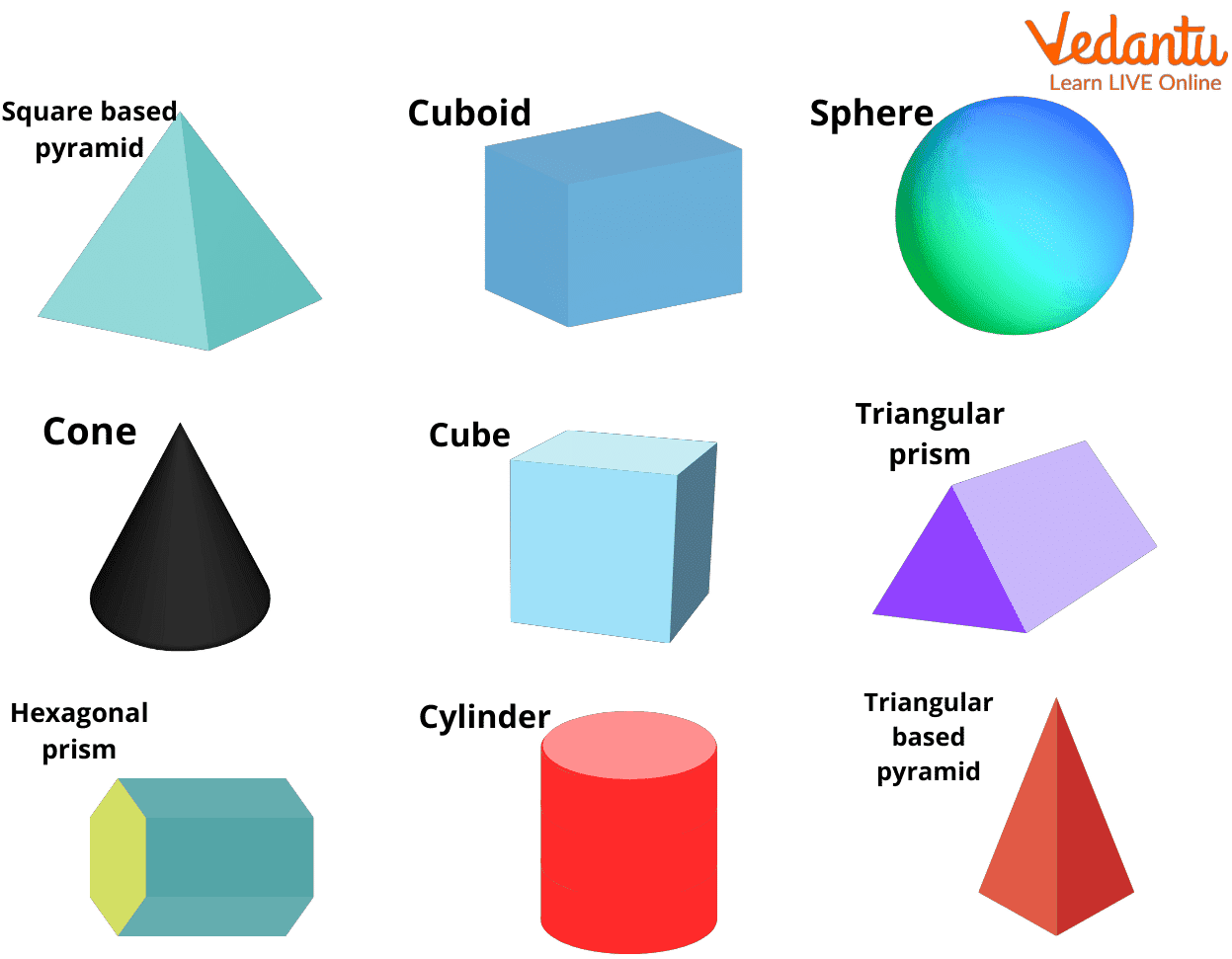
If you are wondering why we are studying cone shape and what is so special about it? Here is your answer.
A cone has only one flat face but all the other 3-D shapes have more than one or zero flat sides. A cylinder has two faces, while a sphere has none.
A cone has one circular face and one flat surface, which is unlike any other figure.
Cone is also the only shape that has one vertex. A pyramid has a vertex on its top that looks similar to that of the cone. But, a pyramid also has other vertices at its base).
Another characteristic of a cone shape is that we can not stack the cones, unlike other shaped things. We can only roll a cone.
Therefore, no other 3-D figure has exactly one face and one vertex.
Real-Life Examples of Cone Shape
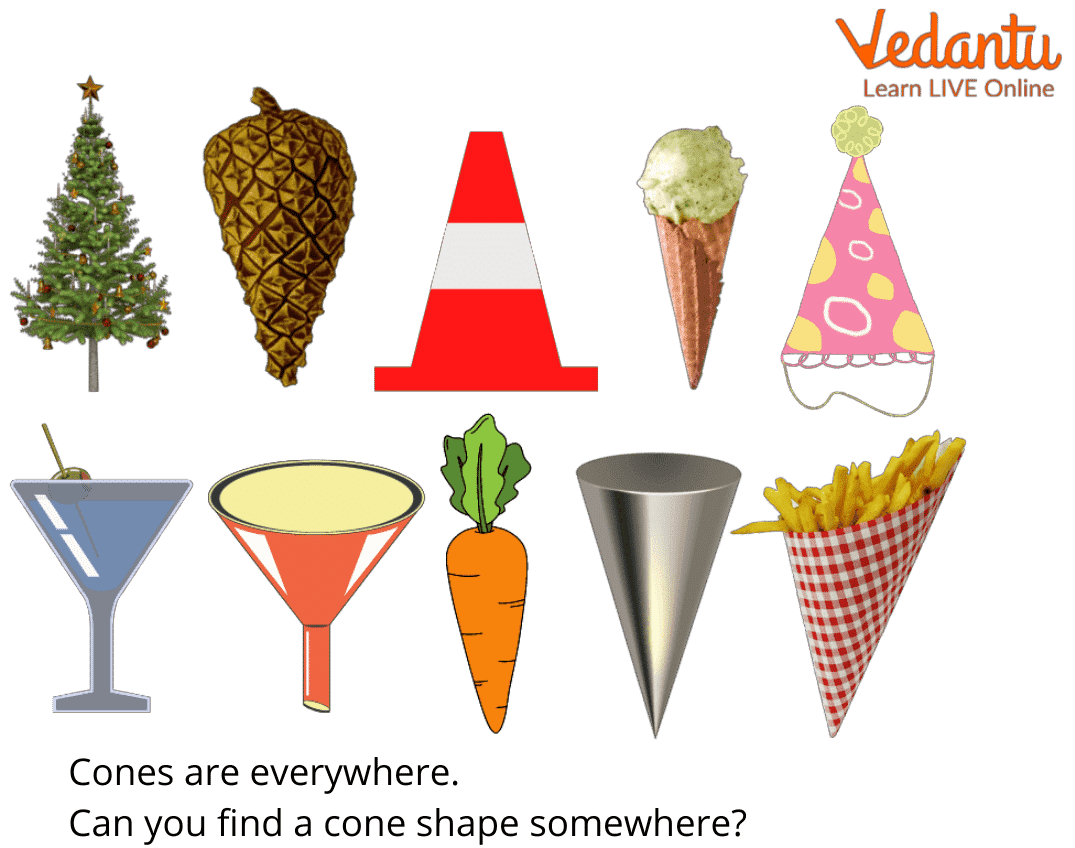
Can you guess some things around us that have a cone shape? Here are some of them.
An ice cream cone.

A birthday cap.

A Christmas tree.

The orange-coloured traffic cones.
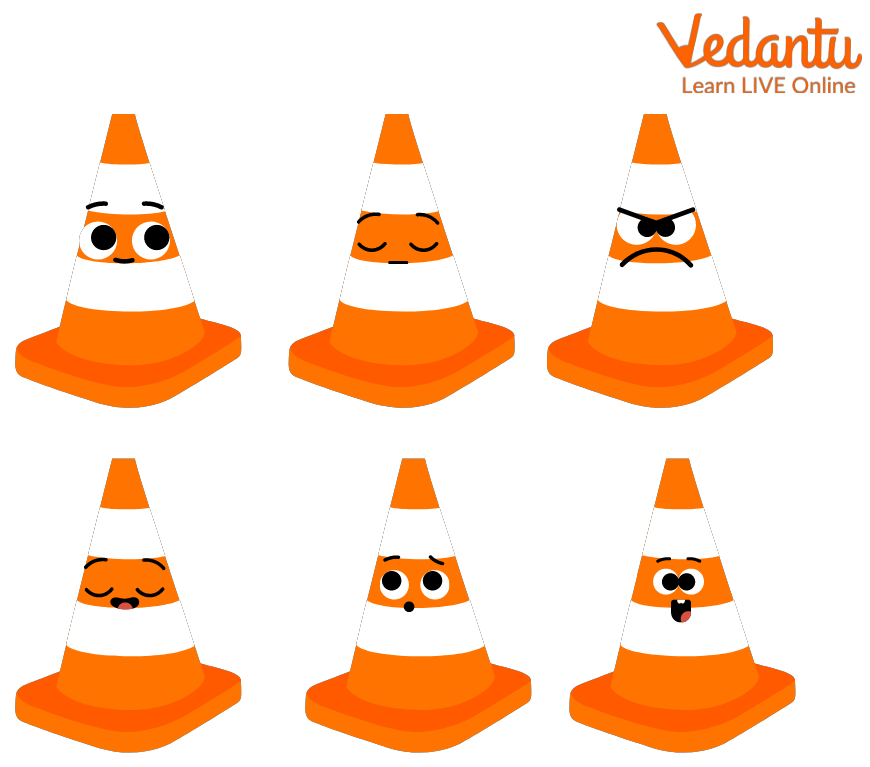
Conical tents.
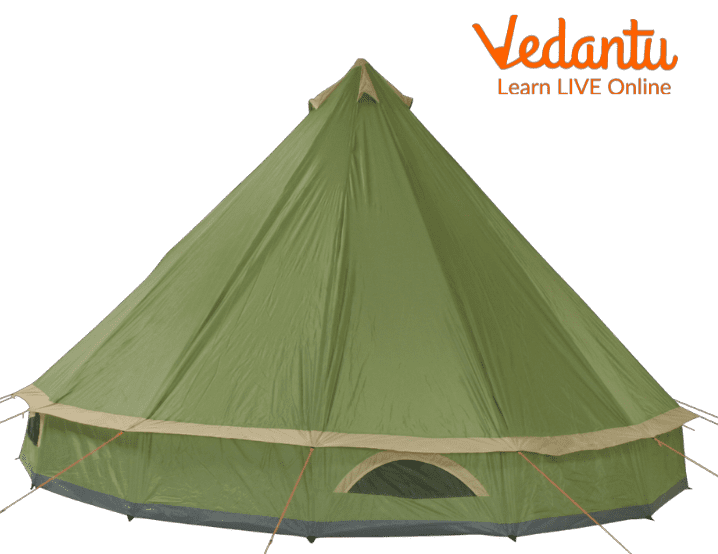
A megaphone

Conclusion
Did you enjoy learning about the cone? Isn’t it fun knowing that many things around us have a cone shape? Well, since the cone is one of the fundamental geometrical shapes, you must know all about it. But apart from cone shapes, you must also learn about other geometrical shapes, which are available at our website.
Visit our website to learn different concepts of maths in a very interesting manner. So, what are you waiting for? Explore all the resources with just a click.
FAQs on Cone Shape: Meaning, Properties & Uses
1. What is a cone shape called?
A cone shape is simply called a cone in mathematics and geometry. In more technical terms, it can be described as a three-dimensional geometric solid that has a circular base and a single vertex (apex) not on the base. The mathematical term 'cone' applies to both the shape and the object itself, forming an important part of geometry lessons at Vedantu.
2. How many faces are in a cone?
A cone has 2 faces:
- A circular face (the base)
- A curved surface (the side wrapping from the base to the apex)
3. What are the 10 examples of cones?
Here are 10 common cone-shaped objects that you might encounter in daily life or during Vedantu's interactive lessons:
- Ice cream cone
- Party hat
- Traffic cone
- Funnel
- Megaphone
- Spinning top
- Conical tent
- Pine cone
- Volcanic mountain (cone volcano)
- Christmas tree (when considered as a perfect geometric cone)
4. How do you describe a cone for kids?
For kids, a cone can be described as a 3D shape that has:
- One flat, round base (like a circle)
- One point at the top (called the apex)
- A curved surface connecting the base to the apex
5. What is the formula for the volume of a cone?
The volume of a cone is calculated using the formula:
$$ V = \frac{1}{3} \pi r^2 h $$
where $r$ is the radius of the base and $h$ is the height of the cone. Vedantu's math educators ensure students understand and apply this formula through interactive problem-solving sessions and live classes.
6. How do cones differ from cylinders and spheres?
Cones, cylinders, and spheres are all 3D shapes, but they have distinct features:
- Cone: 1 circular base, a pointed apex, and a curved surface.
- Cylinder: 2 parallel circular bases connected by a curved surface. No apex.
- Sphere: Completely round, no edges, no vertices, and one continuous curved surface.
7. What are the properties of a cone in geometry?
A cone in geometry has several distinct properties:
- One circular base
- One vertex (apex)
- One continuous curved surface
- No edges between the base and the surface
8. How is the surface area of a cone calculated?
The surface area of a cone is the sum of the area of its circular base and its curved surface. The formula is:
$$ \text{Total Surface Area} = \pi r (r + l) $$
where $r$ is the radius of the base and $l$ is the slant height. Vedantu offers detailed lessons on finding slant height and applying this formula in real-life math problems.
9. Where do we find cone shapes in mathematics and everyday life?
Cone shapes are present in both mathematics and everyday life:
- Mathematics: Used in geometry for teaching 3D shapes and solving volume/surface area problems.
- Everyday Life: Ice cream cones, funnels, traffic cones, megaphones, and more.
























